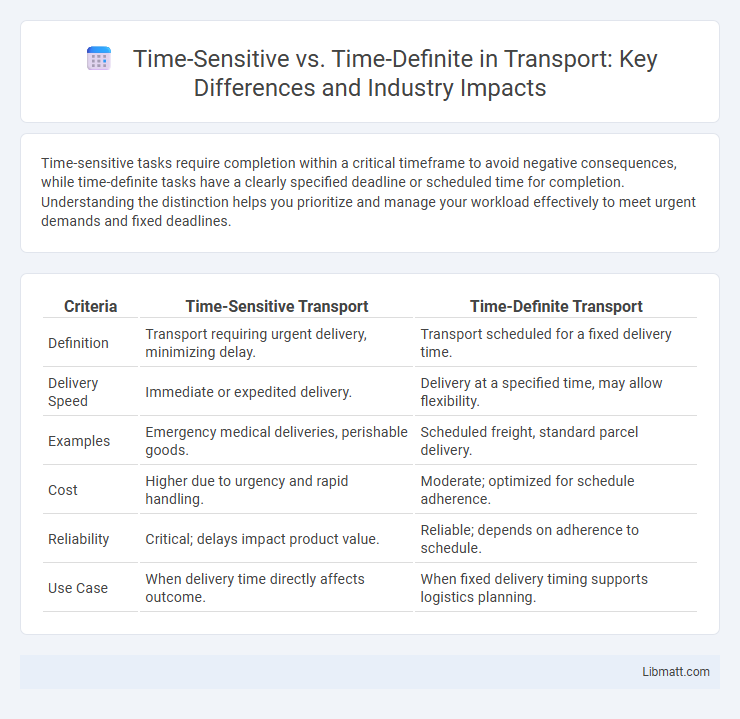Time-sensitive tasks require completion within a critical timeframe to avoid negative consequences, while time-definite tasks have a clearly specified deadline or scheduled time for completion. Understanding the distinction helps you prioritize and manage your workload effectively to meet urgent demands and fixed deadlines.
Table of Comparison
| Criteria | Time-Sensitive Transport | Time-Definite Transport |
|---|---|---|
| Definition | Transport requiring urgent delivery, minimizing delay. | Transport scheduled for a fixed delivery time. |
| Delivery Speed | Immediate or expedited delivery. | Delivery at a specified time, may allow flexibility. |
| Examples | Emergency medical deliveries, perishable goods. | Scheduled freight, standard parcel delivery. |
| Cost | Higher due to urgency and rapid handling. | Moderate; optimized for schedule adherence. |
| Reliability | Critical; delays impact product value. | Reliable; depends on adherence to schedule. |
| Use Case | When delivery time directly affects outcome. | When fixed delivery timing supports logistics planning. |
Introduction to Time-Sensitive and Time-Definite Concepts
Time-sensitive and time-definite shipping differentiate by urgency and specific delivery commitments; time-sensitive shipments require rapid transit to prevent value loss, while time-definite guarantees delivery within a predetermined timeframe. Time-sensitive services prioritize speed and flexibility to accommodate fluctuating demand, often crucial for perishable goods or critical materials. Time-definite services emphasize reliability and precise timing, ensuring shipments arrive by a specified deadline to meet planned schedules.
Defining Time-Sensitive in Modern Operations
Time-sensitive in modern operations refers to tasks or processes that require immediate or near-immediate attention to prevent negative outcomes, such as delays or losses. It emphasizes responsiveness and the ability to quickly adapt to changing circumstances, often involving real-time decision-making and rapid execution. Unlike time-definite services that guarantee delivery by a specific deadline, time-sensitive operations prioritize speed and urgency to optimize efficiency and minimize risk.
Understanding Time-Definite Processes
Time-definite processes guarantee delivery or completion within a specified time frame, ensuring predictability and reliability in operations. These processes optimize scheduling and resource allocation by setting clear deadlines, reducing delays, and improving customer satisfaction. Understanding time-definite methods allows you to manage expectations effectively and maintain high service standards in time-sensitive environments.
Key Differences Between Time-Sensitive and Time-Definite
Time-sensitive shipments require delivery within a critical time window to prevent operational disruptions, while time-definite shipments guarantee delivery at a pre-scheduled date and time. Key differences include flexibility, as time-sensitive services adapt to urgent or changing needs, whereas time-definite services emphasize strict adherence to fixed delivery schedules. Understanding these distinctions ensures your logistics strategy aligns with the urgency and precision your business demands.
Industry Applications: When Timing Matters
Time-sensitive logistics prioritize speed to prevent spoilage or meet critical deadlines, essential in industries like pharmaceuticals or perishable food transport. Time-definite shipments guarantee delivery within a specific window, crucial for sectors such as manufacturing and retail where precise timing ensures smooth operations. Your choice impacts supply chain efficiency, making it vital to align timing needs with industry demands.
Benefits of Time-Sensitive Solutions
Time-sensitive solutions prioritize swift delivery, ensuring that critical shipments reach their destination precisely within required time frames, which reduces the risk of delays impacting operations. These solutions enhance supply chain reliability by minimizing inventory holding costs and preventing production stoppages due to late arrivals. Businesses benefit from improved customer satisfaction and operational efficiency by leveraging real-time tracking and expedited transport modes tailored to urgent delivery needs.
Advantages of Time-Definite Approaches
Time-definite approaches guarantee precise delivery windows, enhancing supply chain reliability and customer satisfaction through predictable scheduling. These methods reduce inventory holding costs by synchronizing shipments exactly when needed, minimizing storage times. Businesses benefit from improved operational efficiency and optimized resource allocation, resulting in streamlined logistics and lower overall expenses.
Challenges in Managing Time-Sensitive and Time-Definite Tasks
Managing time-sensitive tasks presents challenges due to their dependence on fluctuating external factors, requiring rapid adaptation to sudden changes and prioritization under pressure. Time-definite tasks demand strict adherence to fixed deadlines, necessitating meticulous planning and resource allocation to ensure on-time completion. Balancing these demands often leads to conflicts in scheduling and resource distribution, complicating effective workforce and project management.
Decision Factors: Choosing Between Time-Sensitive vs Time-Definite
Decision factors for choosing between time-sensitive and time-definite services revolve around urgency, cost, and precision of delivery. Time-sensitive shipments prioritize speed to meet critical deadlines, ideal for perishable goods or urgent documents, whereas time-definite services guarantee delivery within a specified timeframe, suitable for planned operations and predictable scheduling. You should assess the importance of delivery speed against cost and reliability to select the optimal shipping option.
Future Trends in Time Management and Delivery Systems
Time-sensitive delivery emphasizes rapid response within narrow time windows, while time-definite delivery guarantees precise arrival times, shaping future logistics priorities. Emerging trends prioritize integrating AI-driven predictive analytics with IoT for real-time visibility and dynamic route optimization. These advancements will transform supply chains by enhancing accuracy, reducing costs, and meeting growing customer demands for reliable, timely deliveries.
time-sensitive vs time-definite Infographic

 libmatt.com
libmatt.com